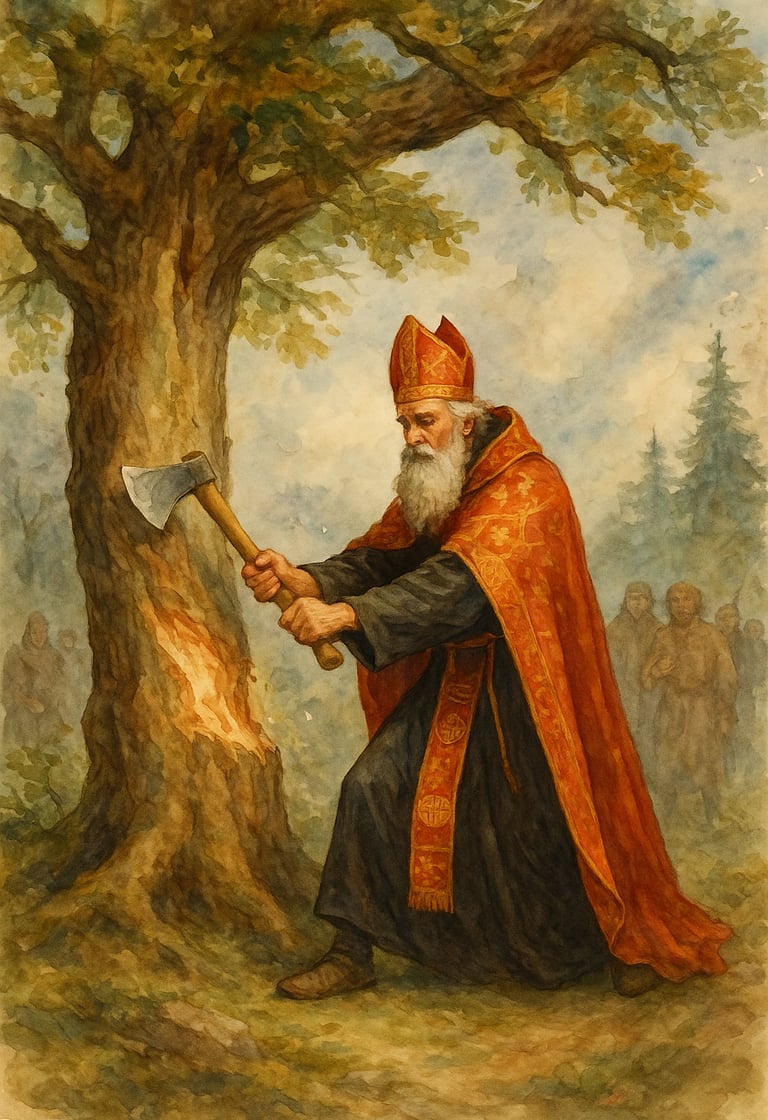St. Boniface
Apostle of Germany | Martyr for the Faith
Halo & Light Studios
6/5/20252 min read


Click link for a reel of Daily Dose of Saints and Faithful Art:
https://youtube.com/shorts/4UNvHGwmoto?si=y8KUJwnxSDO0p8V0
Born as Wynfrith in England around 680, St. Boniface was a man of learning, conviction, and missionary courage. At just 13 years old, he entered the Benedictine monastery of Exeter, where he was formed in Scripture, theology, and the monastic life and later became a monk. Ordained a priest at the age of 30, he quickly became known for his brilliance in preaching and his desire to bring the Gospel to those who had never heard it.
In 716, Boniface received permission from his abbot to travel to Friesland (modern-day Netherlands) to evangelize the pagan people. His first mission, however, was unsuccessful. Despite his zeal, hearts remained closed to the Gospel, and Boniface returned to England—only to be offered the position of abbot at his monastery. He accepted briefly, but his heart remained elsewhere. He soon resigned the position and, in 719, traveled to Rome to seek direction from Pope Gregory II.
There, Boniface made a bold request: permission to preach the Catholic faith to the pagan tribes of Germany. The Pope, impressed by his humility and zeal, gave him full authority to evangelize the Germanic peoples. Thus began one of the most significant missionary movements in Church history.
In one of his most legendary acts, Boniface cut down the sacred Oak of Thor in Geismar, a bold public confrontation of pagan idolatry that led many to abandon false gods and embrace Christ. He went on to baptize thousands, establish monasteries, reform the Frankish clergy, and consecrate bishops—laying the foundation for the Christianization of Germany.
Later appointed Archbishop of Mainz, he became a unifying force between the Church in Rome and the Germanic world, preaching with both fire and gentleness. Even in old age, he remained on mission. At nearly 80 years old, while preparing new converts for confirmation in Frisia, he was martyred by a band of pagans—sealing his lifelong witness with his own blood.
“Let us be neither dogs that do not bark nor silent watchers, but faithful servants who cry out truth with love.” — St. Boniface
St. Boniface stands as a shining witness of missionary courage, fidelity to Rome, and unwavering love for Christ. In an age marked by spiritual confusion, he reminds us that the truth must be preached boldly, lived faithfully, and defended sacrificially. Today, Dokkum is a site of pilgrimage and remembrance, with a shrine and memorial honoring St. Boniface’s martyrdom and missionary legacy. He is the patron of Germany, brewers, and tailors.
